Princeton Scholar Draws Ire For Bragging About Iran’s Revenge For Soleimani
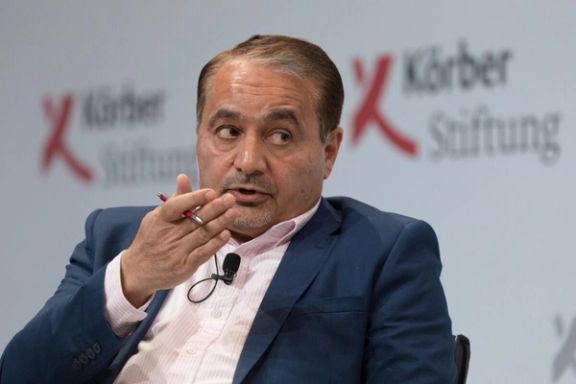
Remarks by a former Iranian diplomat who is now a Princeton University scholar over Iranian threats against American officials have led to controversy.

Remarks by a former Iranian diplomat who is now a Princeton University scholar over Iranian threats against American officials have led to controversy.
In a documentary to mark Qasem Soleimani’s second death anniversary aired by state TV earlier this month, Hossein Mousavian talked about how Iran’s threat to avenge Soleimani killing frightened the wife of Brian Hook, Washington’s special envoy for Iran at the time.
“An American told me that Brian Hook’s wife had not slept for several days and that she was shaking and crying. That’s how afraid they were” Mousavian gloated in the documentary.
In a Friday statement condemning Mousavian, advocacy group United Against Nuclear Iran (UANI) called on Princeton University President Christopher L. Eisgruber “to dismiss him from any association or affiliation with Princeton without delay”, noting that “Ambassador Mousavian’s affiliation with Princeton is a stain on the university’s reputation and credibility”.
Late in December, an American academic who was imprisoned in Iran for 1,216 days, said Mousavian is sympathetic to the Iranian regime, claiming that he stymied efforts to free him from prison.
Mousavian, who traveled to Iran to attend the funeral service of Soleimani, was Tehran’s ambassador to Germanywhen four Iranian dissidents were assassinated at Berlin's Mykonos restaurant in 1992.
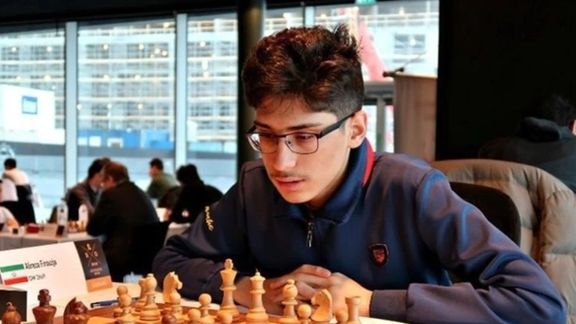
Alireza Firouzja, the 18-year-old chess player who left the Iran team in 2019 due to a ban on competing with Israelis, has won a top international award.
Voters on Chess.com, an internet server, news and networking website with 77 million global users, chose him as the ‘Rising Star’ of 2021, and ranked him second as ‘Player of the Year.’ Firouzja’s game against Hungarian grandmaster Richard Rapport was judged the third best game of 2021.
Magnus Carlsen, the 31-year-old world chess champion, was voted Player of the Year. In December, Carlsen in a blog post wrote he was unlikely to play another match defending his title unless against someone from the “next generation,” which was taken to mean Firouzja, second in world rankings.
Firouzja won the Iranian championship aged 12 and was a grandmaster at 14. He is the second-youngest player ever to reach a rating of 2700, which he did at 16. In December 2019 Firouzja became the first-ever Iranian male chess player to come second in the World Rapid Chess Championship in Moscow.
Firouzja renounced his Iranian citizenship in 2019 over pressure to forfeit matches with Israeli competitors, and now competes as a French citizen at international tournaments.
Iran is among states that do not recognize the state of Israel, a refusal that goes back to the pronouncement by 1979 Revolution leader Ruhollah Khomeini that Iran could have formal relations with any state in the world other than Israel or apartheid South Africa. Tehran prohibits sportspeople from playing against Israeli competitors or pressures them to intentionally lose games so as to avoid competing with Israelis.
Ali Khamenei, Iran’s supreme leader, has often praised Iranian athletes who refuse to play against Israelis, and in September 2021 said they should continue to do so even if facing punishment by international sports bodies.
In November 2020, vice-President of the International Chess Federation Nigel Short warned Iran's Chess Federation that it could be banned from international events if Iranians were not allowed to compete against Israelis.
There have been other sporting and cultural boycotts of Israel in recent years. In 2018 Argentinian soccer players including Lionel Messi refused to play a friendly game in Jerusalem because the ground was on the site of a razed Palestinian village. This week, more than 20 acts withdrew from the Sydney Festival because of Israeli funding. But the Islamic Republic’s ideological basis for its boycott is much more radical. Iranian officials have often called for Israel’s destruction and are supplying arms and money to militant groups.
Among dozens of Iranian athletes who have emigrated over the past two decades, some said they did so because officials forced them to lose titles by refusing to compete against Israelis.
The internationally renowned chess player Ghazal Hakimifard gave up Iranian nationality in 2020 in protest and plays for Switzerland.
Some female athletes say they have left the national team because of mandatory hijab (dress code). Grandmaster Mitra Hejazipour was expelled from the chess team for removing her headscarf during international tournaments.
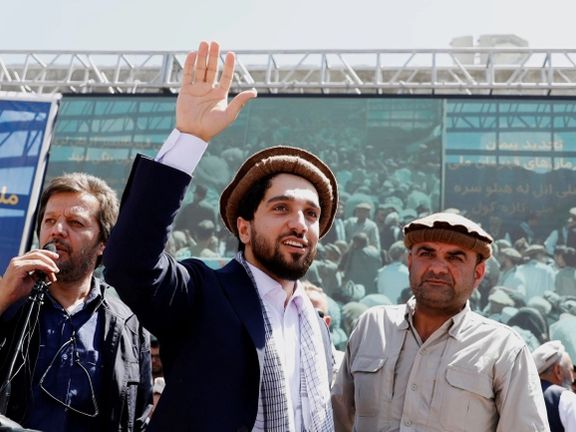
Two sources have told Afghanistan International that the Taliban foreign minister visiting Iran will have a meeting with opposition figures Ahmad Massoud and former Herat governor Ismail Khan.
Taliban's acting foreign minister Amir Khan Muttaqi arrived in Tehran at the head of a high-ranking delegation on Saturday to hold talks with senior Iranian officials.
Later two reliable sources told Afghanistan International that Mutaqqi arrived in Tehran with the invitations of the Islamic Revolution Guard Corps (IRGC). A photo taken in Kabul airport before his departure showed a Mahan airline plane waiting on the tarmac. Mahan is an IRGC-affiliated company.
Representatives of Afghanistan’s Resistance Front did not comment on the possible meeting between Massoud and Motaqqi. The Taliban acting foreign minister had previously offered truce and peace to the resistance Front.
Afghanistan’s economic situation has badly deteriorated since the fall of its internationally recognized government and the Taliban desperately need foreign assistance. Iran has insisted that they should form an inclusive government.
Iran has close ties with the anti-Taliban figures and also cordial relations with the Taliban, whose victory in August was seen by Tehran as a defeat for the United States.
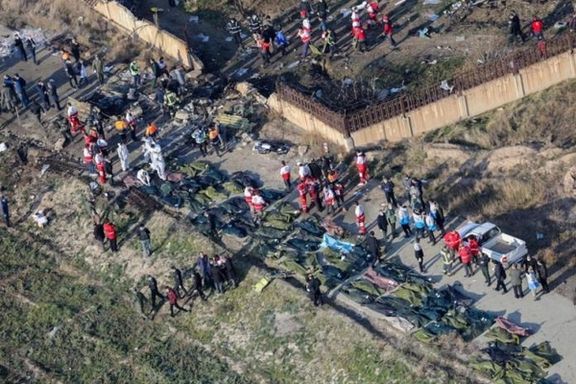
Ottawa has called Iran's downing of a Ukrainian airliner two years ago “a Canadian tragedy” and has called for justice, in a statement to Iran International.
Jason Kung, a spokesperson of Canada’s foreign ministry said that “The families, and the victims, are at the heart of our efforts in the pursuit of transparency, justice and accountability for this tragedy.”
He added, “the Government of Canada is outraged at this refusal to negotiate from the Islamic Republic of Iran. To us, this is a clear indication that Iran plans to continue to shirk its responsibilities, thereby challenging the international rule-based order and refusing to give the families and victims the justice they deserve. We will not stand for this affront to the memories of the 176 innocent victims.”
Iran’s Revolutionary Guard fired two missiles at Ukrainian International Airlines flight PS752 in the morning of January 8, 2020 minutes after it took off from Tehran, downing the plane and killing all 176 people aboard. The act took place hours after Iran had fired ballistic missiles at US bases in Iraq and was expecting a possible military response, but it failed to close the civilian airspace.
Since the tragedy, Iran has refused an independent investigation and according to Ukraine and Canada that had dozens of citizens and permanent residents aboard, has not provided full and convincing answers to questions that can shed light as to what really happened.
“Canada remains committed to seeking answers and pursuing justice for this tragedy for the victims and their families. This includes working vigorously with our partners in the International Coordination and Response Group to hold Iran accountable…and ensuring that Iran makes full reparations for the harm caused to the victims, their grieving families and the affected states,” Kung told Iran International.
A Canadian court just recently awarded C$107 million ($84 million) to the families of six people who had sued Iran. More court cases are pending in Canada.
Iran has said it would pay $150,000 per victim to families, but many say what they really want is the truth of who is responsible for the tragedy. Tehran, meanwhile, has said that senior officials cannot be legally held responsible.
Canada, Sweden, the United Kingdom and Ukraine which are four countries with the greatest number of victims have formed the International Coordination and Response Group to support families of victims of flight PS752. They announced this week that seeing intransigence by Iran, they will pursue the case according to international law.
“Moving forward, the group will focus on subsequent actions to resolve this matter in accordance with international law. At this time, we cannot comment on the specifics of our legal strategy,” the Canadian official said.
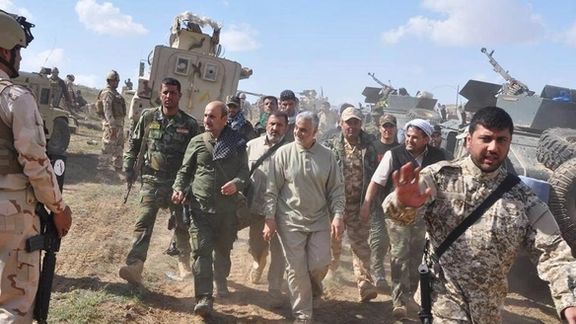
Iran has blacklisted 51 more American nationals for their role in the 2020 targeted killing of Qasem Soleimani, the former commander of its Qods (Quds) force.
The Iranian foreign ministry updated the sanction list on Saturday, adding numerous new names to its previous version that had already included former president Donald Trump, former CIA directors Mike Pompeo and Gina Haspel, former UN envoy John Bolton, former defense secretaries Mark Esper and Christopher C. Miller as well as a few other officials.
Among the new names are Chairman of Joint Chiefs of Staff Mark Milley, former national security adviser Robert O’Brien, CENTCOM chief Kenneth F. McKenzie, Central Security Service chief Paul Nakasone, former national security advisors Matthew Pottinger and Keith Kellogg, and many other people from the military.
According to the statement, all of the people mentioned in the list had some role in the decision-making, planning, organizing, financing, directing or carrying out the strike that killed Soleimani at Baghdad airport in January 2020.
Iran’s President Ebrahim Raisi and Supreme Leader Ali Khamene have time and again vowed revenge for the killing of Soleimani.
Soleimani, who was Iran’s top military and intelligence operator outside its borders, was in charge of supporting and organizing militant proxy forces, including the Lebanese Hezbollah and Iraq Shiite militia groups that have repeatedly attacked US forces.
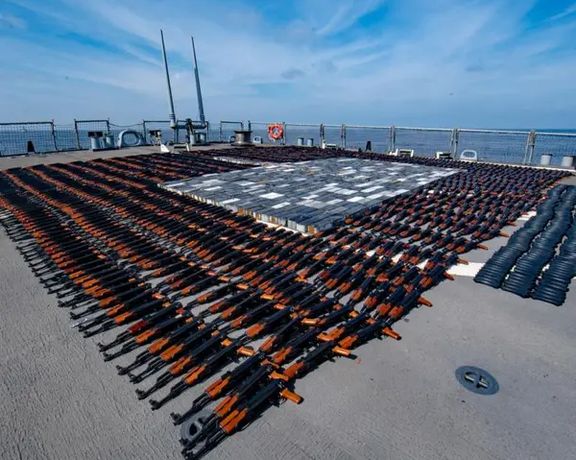
Thousands of weapons destined for the Houthi rebels in Yemen and seized by the US originated from an Iranian port, The Wall Street Journal reported Saturday.
WSJ that had access to a reportby United Nations experts said that Jask port on the Sea of Oman was used by Iran to ship the weapons on small wooden ships. The United States believes these vessels manage somehow to deliver their cargoes to the Houthis under blockade by Saudi Arabia, and also to Somalia.
The United States has made a few seizures on the high seas, each including thousands of small arms and equipment made in China, Iran, Russia, Belarus and elsewhere. In December the US stopped a vessel and seized 1,400 AK-47 assault rifles and 226,600 rounds of ammunition.
The news comes as the United States and other world power are engaged in nuclear talks with Iran in Vienna. Regional countries have been insisting that any new agreement with Iran should include limits to its disruptive regional activities.
The Biden Administration, although acknowledging Iran’s “malign behavior”, believes it must first reach a nuclear agreement in exchange for lifting sanctions. Critics say that once Iran is free to sell its oil and get the desperately needed foreign currencies, it will never make concessions on other issues.